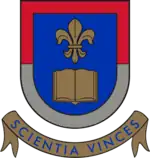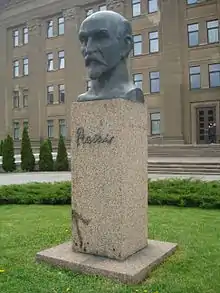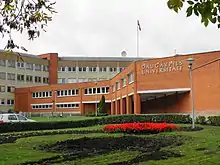University of Daugavpils
The University of Daugavpils (Latvian: Daugavpils Universitāte, DU) is a public university in Daugavpils, Latvia, and the largest regional university in the country.
Daugavpils Universitāte | |
 | |
Former names | Daugavpils Pedagogical Institute |
|---|---|
| Motto | Latin: Scientia Vinces |
Motto in English | Through knowledge you win |
| Type | Public |
| Established | 1921 |
| Rector | Irēna Kokina |
Administrative staff | 229 |
| Students | 4,200 (2008) |
| Address | 13 Vienības Street , , |
| Campus | Urban |
| Website | www.du.lv |
History
The university was founded in 1921 as a teachers’ college. Its director between 1923 and 1940 was Valērija Seile.
Chronology of nomenclature:
- 1921–1923 Daugavpils Teachers' Seminary (Daugavpils skolotāju seminārs)
- 1923–1952 Daugavpils State Teachers' Institute (Daugavpils Valsts skolotāju institūts)
- 1952–1993 Daugavpils Pedagogical Institute (Daugavpils Pedagoģiskais institūts)
- 1993–2001 Daugavpils Pedagogical University (Daugavpils Pedagoģiskā Universitāte)
DU received its present name on 13 October 2001. It has become the largest educational institution in Eastern Latvia and is a member of the European University Association and EU²S², the European Union association of universities of small member states.
On 1 March 2018 the Daugavpils Medical College (lv) was integrated into the university as an autonomous institution. The college provides education in Nursing, Medical care, Social care and Social rehabilitation.
Organisation

Faculties and departments
The University consists of five faculties:[1]
- Faculty of Humanities
- Department of English Philology and Translatology
- Department of Russian and Slavic Linguistics
- Department of Latvian Literature and Culture
- Department of Latvian Language
- Department of Foreign Languages
- Department of History
- Faculty of Social Sciences
- Department of Economics and Sociology
- Department of Social Psychology
- Department of Law
- Faculty of Natural Sciences and Mathematics
- Department of Information Science
- Department of Physics
- Department of Mathematics
- Department of Chemistry and Geography
- Department of Anatomy and Physiology
- Faculty of Music and Arts
- Department of Music
- Faculty of Education and Management
- Department of Pedagogy and Pedagogical Psychology
- Department of Sport
Institutes and centres
- Centre of Lithuanistics
- Centre of Russian Language and Culture
- Oral History Centre
- Regional German Language and Country Studies Centre for Further Education
- Guntis Liberts Innovative Microscopy Centre
- Institute of Ecology
- Institute of Systematic Biology
- Institute of Art
These are divided into 51 study programmes that train biologists, programming engineers, physicists, intercultural relations managers, institutional managers, economists, psychologists, artists, linguists, interpreters, career consultants and other specialists. The university offers Doctoral, Bachelor and Diploma level studies.
The main foci of research at DU are Literature, Linguistics, History, Biology, Environmental Science, Physics, Economics, Sociology, Psychology, Education and Art. The university has thirteen research centres, and has benefited from EU Structural Funds since 2004 (e.g. purchasing of ZEISS laser scanning microscopes). The language of instruction is usually Latvian.
Rectors

The following have served as university rectors/institute directors:
- Jānis Jirgens (1921–1922)
- Eižens Vietnieks (1922–1923)
- Valērija Seile (1923–1940)
Closed 1940–1944
- Leontijs Viškarevs (1944–1946)
- Vitālijs Pautovs (1946–1952)
- Ivans Petrovs (1952–1953)
- Krišs Grašmanis (1953–1958)
- Vitālijs Bauskis (1958–1962)
- Anna Kalnbērziņa (1962–1971)
- Gunārs Gulbis (1971–1977)
- Oļegs Roždestvenskis (1977–1992)
- Bruno Jansons (1992–1998)
- Jānis Pokulis (1998–2002)
- Zaiga Ikere (2002–2007)
- Arvīds Barševskis (lv) (2007–2018)
- Irēna Kokina (2018–present)
Enrollment

In 2008 more than 4200 students were enrolled in study programs. A large Russian-speaking enrollment facilitates cooperation with universities outside of the European Union in the CIS, e.g. Scientific Readings, Slavonic Readings, and various thematic conferences.
Students can use Erasmus+ mobility options to study for one or two semesters at European partner universities. Students are able to receive funding from the Else Marie Tschermak Foundation in Denmark to study or conduct research abroad.
Student life is organised through the Students’ Council, the campus newspaper “Lai Top!” (Let it be!), the Latgale Students’ Centre, the Association of Young Scientists of Daugavpils University “DUJZA”, the Art Teacher's Union, the Health Care Centre and Natural Research and Environmental Education Centre. Students can also acquire a foreign language, take part in the students’ dance ensemble “Laima” and utilize a Sport Complex. Interested students have the opportunity to work in the research institutions and centres.
Notable alumni
- Aleksandrs Kudrjašovs – metropolitan of the Latvian Orthodox Church
- Anastasija Grigorjeva – European freestyle wrestling champion and Olympian
- Marjana Ivanova-Jevsejeva – member of the Saeima and member of the board of Olainfarm
- Inese Laizāne – member of the Saeima and director of the Daugavpils Theatre
- Yakov Pliner – member of the Saeima
- Ivans Ribakovs – member of the Saeima
- Valērijs Buhvalovs – member of the Saeima
- Jānis Dukšinskis – member of the Saeima
- Dagnija Staķe – member of the Saeima, Minister of Welfare and Minister of Regional Development of Latvia
Notable academics
- Joel Veinberg – orientalist and Jewish historian
- Jānis Brikmanis – zoologist